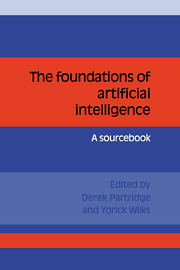Book contents
- Frontmatter
- Contents
- List of contributors
- Preface
- Acknowledgments
- 1 Introduction
- 2 The formal foundations of AI
- 3 Levels of theory
- AI: a personal view
- Has AI helped psychology?
- What's in an AI program?
- 4 Programs and theories
- 5 The role of representations
- 6 The role of programs in AI
- 7 Rational reconstruction as an AI methodology
- 8 Is AI special in regard to its methodology?
- 9 Does connectionism provide a new paradigm for AI?
- 10 The role of correctness in AI
- 11 Limitations on current AI technology
- 12 Annotated bibliography on the foundations of AI
- Index of names
What's in an AI program?
Published online by Cambridge University Press: 03 May 2010
- Frontmatter
- Contents
- List of contributors
- Preface
- Acknowledgments
- 1 Introduction
- 2 The formal foundations of AI
- 3 Levels of theory
- AI: a personal view
- Has AI helped psychology?
- What's in an AI program?
- 4 Programs and theories
- 5 The role of representations
- 6 The role of programs in AI
- 7 Rational reconstruction as an AI methodology
- 8 Is AI special in regard to its methodology?
- 9 Does connectionism provide a new paradigm for AI?
- 10 The role of correctness in AI
- 11 Limitations on current AI technology
- 12 Annotated bibliography on the foundations of AI
- Index of names
Summary
Artificial Intelligence is a methodological mess: a surfeit of programs and a dearth of justified theories and principles. Typically we have a large and complex program that exhibits some interesting behaviours. The underlying principles are anybody's guess.
In addition, if principles are presented, the gulf between program and principle is sufficient to preclude any systematic discussion of the program-principle relationship. We must do more than just present a principle.
A methodology for abstracting and justifying the principles that underlie an AI program is explained and demonstrated. The viewpoint taken is that we cannot prove that a program embodies a given principle; we can only make a claim to this effect with an explicit supporting argument, and thereby provide a concrete basis for discussion of the credibility of the putative principle.
Introduction
AI is largely a behavioural science: a science that is founded upon the behaviour of programs. The working program embodies the theory or set of principles.
Computer programs are very persuasive arguments for the theory that they model. They are also largely incomprehensible to anyone but (or including?) their author. Hence whilst the credibility of the theory is founded on the program the theory, presented perhaps in terms of principles, is necessarily couched in the vagaries and generalizations of the English language; the relationship between the working program and the comprehensible principles can only be founded on faith. We need something better than this.
Information
- Type
- Chapter
- Information
- The Foundations of Artificial IntelligenceA Sourcebook, pp. 112 - 118Publisher: Cambridge University PressPrint publication year: 1990
Accessibility standard: Unknown
Why this information is here
This section outlines the accessibility features of this content - including support for screen readers, full keyboard navigation and high-contrast display options. This may not be relevant for you.Accessibility Information
- 1
- Cited by
